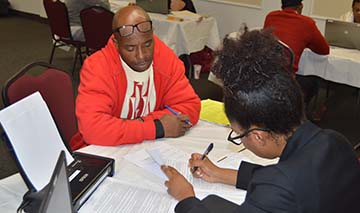For the past 16 years, it has been a struggle for Rodney Jones, 50, to find permanent employment. He acquired trade experience in construction and forklift operations. He even gained apparel skills while attending a Baltimore City vocational high school and when he worked at Jos. A. Bank, and training as a cable TV technician from Sojourner Douglass College.
The barrier, he says, is a criminal record that began at age 22 when he started selling drugs. The street hustle was fun at that time, he says, and the extra money helped him to care for his mother, girlfriend and a young child, especially after he was laid off.
Raised the youngest of 10 children in a two-parent household, Jones says those are times he regrets and is still paying for. His crimes eventually landed him in jail. He was released in 2000.
“When an employer puts in your social security number, they see you have a record, they’re not going to hire you,” said the affable father of four children who range in age from 33 to 15. He lives with the mother of the children in Baltimore.
With recently passed state legislation, offenders can get a second chance. Senate Bill 1005, Justice Reinvestment Act, gives offenders an opportunity to expunge their criminal records of certain charges from public inspection.
On Oct. 1, Maryland Legal Aid Bureau and members of District 10 and District 44B hosted an expungement clinic at Morning Star Baptist Church in Woodlawn. Jones was among the men and women from the city and county who were waiting at the door before doors opened at 9 a.m. He agreed to share his experience to encourage others.
Attorney Zenia Wilson, who worked with him on the expungement process, first went through an online case search to find his charges. Rodney Jones signed 14 petitions to have 14 criminal charges expunged. Several individuals also named Rodney Jones would come up. The three convictions, he had, cannot be expunged, but still Jones was grateful. The State’s Attorney has 30 days to accept or reject the petitions. If they are accepted, Jones will get an order of compliance from the court, where the charges have to be removed from the case search or hard copies shredded. It is up to the person to follow up.
Most of the charges he has racked up since 1988 are related to possession and distribution of drugs. However, as Wilson went through the search, some of the charges came back: impersonating a police officer, which he says got when he referred to himself as Officer Jones while working a security detail, causing a false fire alarm when he called 911 out of concern, when a friend she respond to his phone calls; loitering and disturbing the peace; and telephone harassment.
Odd jobs helped him pay the bills but he wants more for his future. When he found out that he could get his charges expunged, Jones made his way to Morning Star Baptist Church on Oct. 1.
Sen. Delores Kelley said the clinics such as the Oct. 1 clinic are very important. “People need a second change and in some cases people have been wrongly convicted in the first place. They can only thing for them to do is go through this expungement clinic.”
“Thank you Jesus,” a relieved Jones said after the half hour he spent with the attorney. “I’m not a bad person. There’s nothing for me in the streets. My dream is to own my own car wash business.”
Del. Ben Brooks said, “The expungement will provide a pathway for individuals to migrate back into their various communities, unrestrained, now that their debt to society has been paid.”
Del. Charles Sydnor III, who helped organize the clinic, said, helping people secure employment opportunities has been a priority since he decided to run for office. “I’m not a businessman but I can help people tear down barriers that exist. This is just one way.”
Others on hand were representatives from the Division of Parole and Probation, Baltimore County Department of Workforce Development, volunteers from Phi Beta Sigma, and Delegates Ben Brooks, Adrienne Jones and Sen. Delores Kelley.
Much of the work regarding the expungement in the bill came out of a report by the Justice Reinvestment Coordinating Council in December 2015.
According to the report, the council noted that while the overall number of offenders admitted to prison has declined by almost 20 percent in the last decade, more than half of prison admissions had underlying nonviolent offenses. Almost 60 percent of all prison admissions represent failures of probation, parole, or mandatory release supervision; many of these stem from technical violations, such as missing an appointment or failing a drug test.
The report goes on to say that offenders in the state of Maryland are also spending longer periods of time in incarceration. The state has a larger share of its offender population incarcerated than other states. Specifically, of the state’s offender population, 41 percent are incarcerated and 59 percent are supervised in the community, as compared to the national average of 30 percent and 70 percent, respectively.
Senate Bill 1005 is part of an effort to reduce the prison population and shift the focus on crime prevention and treatment rather than jail time. The bill reduces the maximum penalties for convictions on drug distribution charges and repeals mandatory minimum sentences for nonviolent drug crimes. Some of the provisions don’t take effect until October 2017.

